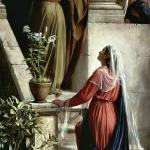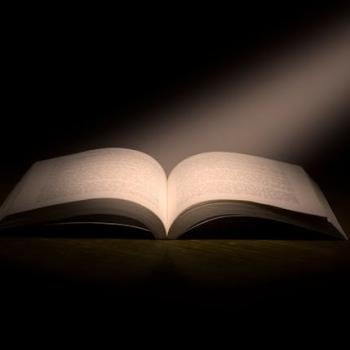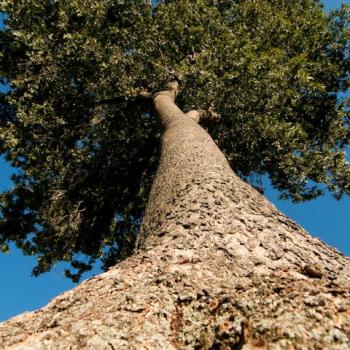Christmas is known throughout the world as both a religious and secular holiday. Regardless of culture, there’s likely someone in every nation who has heard of Christmas. Whether loving the decorations, carols, Santa Claus, gift giving, or Jesus, Christmas is a universal hodgepodge of winter festivals. As Christmas has a way of overshadowing other holidays, it’s easy to assume Christmas is the only holiday in December. In actuality, there are over forty different seasonal, holiday, cultural, and secular festivals that take place that happen either in or around the month of December each year.

We say “happy holidays” to acknowledge the diversity of festivals, seasons, memorials, and holidays that many observe the world over at this time of year. Below are ten different festivals, holidays, memorials, and occasions celebrated in the month of December that you’ve probably never heard of – but are definitely worth learning more about.
Advent (four to six weeks before Christmas)
Advent is the liturgical season prior to Christmas in Catholic, Orthodox, and some Protestant denominations. It is the four Sundays prior to Christmas in the western tradition and six weeks prior to Christmas in the east. In the eastern rite, Advent is marked by a required fast. (While the specific details of the fast vary, at some point within the six-week period, Orthodox Christians are required to abstain from red meat, poultry, meat products, eggs, dairy, fish, oil, and wine.)
The preliminary weeks of Advent represent the four to six thousand year period humanity waited to receive the Messiah. It’s a solemn time, identified with a sense of hopeful preparation for both Christ’s birth and His second coming. Advent is best known for the advent wreath: four candles (either three purple or blue with one pink; some traditions use all white candles while others place a white candle in the center) surrounded by greenery. Within the Advent season are a number of different feast days, including St. Barbara’s Day (December 4), St. Nicholas’ Day (December 6), Feast of the Immaculate Conception (December 8), and St. Lucy’s Day (December 13).
Chalica (First Monday-First Sunday in December)
Chalica is a modern Unitarian Universalist holiday. It was first introduced in 2005 and, while unique, doesn’t have a large following. Much like the traditions of Hanukkah and Kawanzaa, Chalica exists to celebrate the seven principles of Unitarian Universalism:
- The inherent worth and dignity of every person
- Justice, equity and compassion in human relations
- Acceptance of one another and encouragement to spiritual growth in our congregations
- A free and responsible search for truth and meaning
- The right of conscience and the use of the democratic process within our congregations and in society at large
- The goal of world community with peace, liberty, and justice for all
- Respect for the interdependent web of all existence of which we are a part
Each night honors a different Unitarian Universalist principle. A chalice, typically surrounded by seven candles, is lit. Each night, a candle is also lit and a principle read. In accord with the festival, participants should honor each principle (donating to a political cause, volunteering for something, etc.). Participation does vary, although group activities may include discussion, songs, or projects.
There is also a seven-week version of Chalica (observed by some Unitarian Universalist groups) that begins in January.
Karthika Deepam (November-December)
Karthika Deepam (also known as Trikkartika, Thiru Karthika, Thiru Karthikai, Kathika Purnima, Bharani Deepam, Annmalai Deepam, Vishnu Deepam and Lakshabba) is an ancient three-day festival of lights observed mostly in parts of India and Sri Lanka. It starts on the full moon day of the eighth month of the Hindu calendar, falling in November or December each year. To celebrate, Tamil Hindus light lamps in sequence, usually in rows of clay oil lamps.
Light is a symbol of good luck, warding off evil spirits and welcoming prosperity and joy. The festival also celebrates the bond between brothers and sisters in South India.
Karthika Deepam celebrates a number of different legends, including worship of the Kartika constellation. This collection of six stars are believed to represent the Kartika nymphs who raised six children created from the six faces born from the third eye of Shiva, a primary Hindu deity. (They were later merged into one child by Parvati, his mother.) Because the nymphs were involved in child rearing, they were granted immortality as eternal stars in the sky.
In a different legend, Shiva once appeared as an endless flame of light before Vishnu and Brahma. The two were arguing over who was supreme, and Shiva sought to end the dispute of the two: whichever could discover his head and feet would reign supreme. Vishnu appeared as a boar, while Brahma rode a swan. Vishnu acknowledged failure, but Brahma persisted. Upon discovering a flower on Shiva’s head, Brahma believed he found Shiva’s head. Shiva told him he was wrong and declared there would never be a temple to Brahma. Obviously, the dispute didn’t work out quite as planned. Still, Hindus embrace Shiva’s appearance as a jyotirlinga, or fiery pillar of light, during this festival. Many also pray and make offerings to Shiva.
Bodhi Day (December 8)
Bodhi Day is a Buddhist festival celebrating the enlightenment of Siddharta Gautama (the Buddha). While traditions vary, the Buddha is said to have forsaken traditional Hindu ascetic practices, sat under a Bodhi tree, and engaged in simple meditation until he discovered the source of universal suffering and the path to ultimate liberation. The Pali Canon (Buddhist writings in the Pali language) says the Buddha came to enlightenment in three stages: First, he discovered his past lives in the cycle of rebirth; second, he discovered the law of Karma and the importance of the Noble Eightfold Path, and third, he discovered the Four Noble Truths, then to reach Nirvana. Upon doing so, he became enlightened.
Celebrated throughout the Buddhist world, Bodhi Day is observed with meditation, chanting of Buddhist texts, acts of goodwill, and a feast or meal.
Human Rights Day (December 10)
A secular holiday, Human Rights Day is celebrated on December 10th each year. It commemmorates the United Nations’ adoption of the Universal Declaration of Human Rights in 1948. Though the document is too long to reprint in its entirety, the first article sums up its intention:
“All human beings are born free and equal in dignity and rights. They are endowed with reason and conscience and should act towards one another in a spirit of brotherhood.”
The day is celebrated with political conferences and meetings. The United Nations Prize in the Field of Human Rights and the Nobel Peace Prize are both awarded. Around the world, different cultures celebrate with events and exhibitions that focus on human rights issues.
Hanukkah (November-December)
Hanukkah (also known as the Festival of Lights) is an eight-night Jewish festival (starting on the 25th day of Kislev) held in November or December. The term “Hanukkah,” literally means “to dedicate.” Its story of political revolt inspired by the faith of the Maccabees brothers is found in the Deuterocanonicals (also called Apocrypha). These documents detail experiences and traditions important to Hellenistic Jews living under Greek rule. In 1 Maccabees, we learn of a three-year revolt against the Seleucid Empire starting in 167 B.C.
According to record, King Antiochus IV Epiphanes didn’t like the Jewish people. His claim to fame was stealing from the temple treasury after a raid during the Sixth Syrian War. In his campaign, all Jewish practices were banned, Jerusalem was under Seleucid rule, and the Second Temple was used for a merged system of paganism and Judaism. Jews were enslaved, required to eat pork, work on the Sabbath, and leave their male children uncircumcised. In response, Judah Maccabee and his family rose up against the oppression, fighting for Jewish independence.
During battle, Judah enters the temple. He discovers a jar of undefiled oil, enough to burn for one day. Miraculously, it burned for eight days. The revolutionaries conquered the Empire, and the temple was rededicated. Hanukkah is the celebration of this victory.
Hanukkah’s notable symbol is an eight-branched menorah. A candle is lit each night of Hanukkah until all eight candles are lit. The candles are left to burn down, and are replaced the next night. Participants also read and recite Scripture daily (especially some Psalms), giving to the poor, singing hymns, meals, songs, games (especially dreidel), and giving gifts. Fried foods cooked in oil, such as latkes (potato pancakes) and donuts, grace festive tables.
Longest Night (around December 21)
Longest Night (also called Blue Christmas) is a special service for those experiencing grief. Held on the longest night of the year (somewhere around the Winter Solstice), this practice seeks to help people deal with the “darkness” of loss and grief. Undertones of the day include doubt (it coincides with the Feast of St. Thomas, the “doubter”), trials of faith, and ultimately, healing. People observe Longest Night in some Roman Catholic and Protestant traditions.
The night service focuses on expression of grief, heartache, emotional distress, pain, and sadness. Candles are lit (such as an Advent wreath) and empty chairs reserved in memory of lost loved ones. Communion is often central, reminding participants of the importance in union with God and each other.
Feast of Anastasia of Sirmium (December 25)
December 25th is not only Christmas Day. It’s also a feast day for at least five different saints: Anastasia of Sirmium, Eugenia of Rome, Adalsindis, Alburga, and Michael Nakashima. Here, we will explore Anastasia of Sirmium, an early church martyr.
St. Anastasia (also known as Anastasia of Sirmium and Anastasia the “Deliverer from Potions”) lived during the Diocletian persecution. Her father was a noble pagan and her mother was a Christian. Anastasia was baptized as an infant and raised a Christian in secret. After her mother’s death, she was forced it marry a pagan named Publius. During the marriage, she ministered to imprisoned Christians. When her husband found out, he beat her and locked her away. She was told by her spiritual adviser, Chrysogonous, to be brave and patient. Her husband soon died while in transit, and she gave her property to the poor. She then set off to follow her spiritual adviser, heading to Aquileia (a city in modern-day Italy).
Chrysogonus was arrested and beheaded. After his death, Anastasia resumed work with Christian prisoners. Eventually, she was arrested and given the choice to embrace pagan riches or torture. She chose torture. When a Roman official tried to rape her, he was struck blind and developed a severe headache. On his way to a pagan temple, he died. Anastasia was set free.
Later, she was later arrested again and survived starvation and attempted drowning. After the failed drowning, she joined with another Christian and baptized 120 people. Finally, she was taken to Palmaria, staked to the ground, and burned alive. She died on December 25, 304. Her feast is acknowledged with a special commemoration, by name, in the second mass held on Christmas Day in Roman Catholic services. She is one of only seven women to have this honor.
Zarathosht No-Diso (December 26)
An essential day of remembrance for Zoroastrians, Zarathosht No-Diso commemorates the death of the Prophet Zoroaster. It falls on the 11th day of the month of Dae, coinciding with December 26th on the Gregorian calendar. Zoroastrians remember their prophet by visiting their fire temples, lectures and discussions about his work and life, and special prayers. As Zoroastrians don’t mourn, they remember and worship instead.
Watchnight (December 31)
The idea of a Watchnight, or vigil service, exists across a number of Christian denominations. It’s not uncommon for Christians to seek the Lord on December 31st, repent of sins, and start the new year fresh. However, many do not understand the relevance of Watchnight’s prevalence among African-American congregations.
The history of Watchnight among African-American churches (across a number of denominations, but starting with Methodists) dates back to New Year’s Eve, 1862. Known as Freedom Eve, slaved awaited the hour when the Emancipation Proclamation was to take effect on January 1, 1863. Today, African-Americans celebrate Watchnight with New Year’s Eve church services. They stand as strong community symbols of both faith and unity. Services include worship and dance, prophecies for the new year, special petitions, and encouragement to approach the new year with faith and confidence.
Watchnight is also a prominent observance among Korean Christians.
The meaning of December holidays
This article represents only a fraction of December holidays found throughout the world. December holidays reflect seasonal changes, spiritual growth, and memories of special figures, times, and values. Obviously a special time of year, december holidays provide an important grounding for all people, regardless of beliefs. As we prepare for the end of one year and the passage into another, December holidays give us incentive and focus to do so with spiritual values front and center.
To all who read this, no matter how you celebrate…Happy December Holidays!













